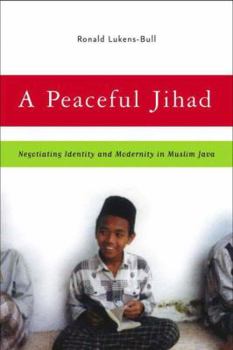A Peaceful Jihad: Negotiating Identity and Modernity in Muslim Java
(Part of the Contemporary Anthropology of Religion Series)
Select Format
Select Condition 
Book Overview
Based on extensive ethnographic research, this book examines how the Islamic community in Java, Indonesia, is actively negotiating both modernity and tradition in the contexts of nation-building, globalisation, and a supposed clash of civilizations. The pesantren community, so-called because it is centered around an educational institution called the pesantren, uses education as a central arena for dealing with globalization and the construction and maintenance of an Indonesian Islamic identity. However, the community's efforts to wrestle with these issues extend beyond education into the public sphere in general and specifically in the area of leadership and politics. The case material is used to understand Muslim strategies and responses to civilizational contact and conflict. Scholars, educated readers, and advanced undergraduates interested in Islam, religious education, the construction of religious identity in the context of national politics and globalization will find this work useful.
Format:Paperback
Language:English
ISBN:1403966605
ISBN13:9781403966605
Release Date:May 2005
Publisher:Palgrave MacMillan
Length:152 Pages
Weight:0.45 lbs.
Dimensions:0.4" x 5.8" x 8.2"
Customer Reviews
1 rating
Is Peaceful Jihad possible?
Published by Thriftbooks.com User , 19 years ago
Ronald Lukens-Bull's book Peaceful Jihad is one of the most recent ethnographic attempts to understand Indonesian Islam. The major topic addressed in this ethnography is how the process of modernity has been innovatively and selectively modified by Muslims in Indonesia (especially east Javanese)to reconstruct their own unique forms of Islam. In this work, Lukens-Bull recognizes the early pioneering understandings of Indonesian Islam by Geertz as too limited in representing Islam as a thin lacquer spread over the Hindu-Buddhist cultural fundamentals. Geertz had viewed Indonesian Islam as a struggle between the Santri, an urban, modernist strain of Islam, versus the rural traditionalist or popular syncretic abangan believers. Lukens-Bull building on the research of more contemporary anthropologists such as John Bowen, Robert Hefner, Suzanne Brenner, Mark Woodward has shown that these early Geertzian categories were too crude. Lukens-Bull has added to this anthropological research by focusing on the dynamics of the Islamic schools in east Java known as pesantren. He did in-depth research in the 1990s on how the Islamic teachers and leaders within the pesantren were incorporating the political and symbolic-cultural matrix into the curriculum. Lukens-Bull describes how various symbols of Sufism, modernity, and secular elements were drawn into the debates about what ought to be incorporated into the curriculum within the pesantren. He also adds an interesting postmodern reflexive insight into this process by illuminating how a particular Sufi leader used him as a Westerner as an example to the students of how to purify and dissolve incorrect "Christian" teachings from his consciousness. Lukens-Bull goes beyond the reformist/modernity-traditionalist dynamic within Islam to demonstrate how these young students were weaving their understandings of secularism, political economy issues, and so-called "clashes of Asian-Islamic civilization with the West to construct and drive new forms of non-secularized and spiritualized forms of modernity. He draws on Robert Bellah and Anthony Giddens as sociologists as well as anthropologists such as Arjun Appadurai to discuss these new forms of modernity. In the final chapter, Lukens-Bull defines the contours of this "Peaceful Jihad" as represented within the voices of these young students in contrast to the terrorist movements of Jemaah Islamiyah (JI) or Laskar Jihad. He suggests that the culturally deep seated Sufi tradition as maintained within the pesantren communities of east Java provides a basis for constructing an Islamic identity that is distinctive from these radical militant forms of Islam. Lukens-Bull ends his discussion of Indonesian Islam with perspicuous questions that have relevance when thinking about the Western political and cultural strategies in respect to Muslims. These questions involve whether we in the West can accept forms of pluralism, civil society, democracy,





